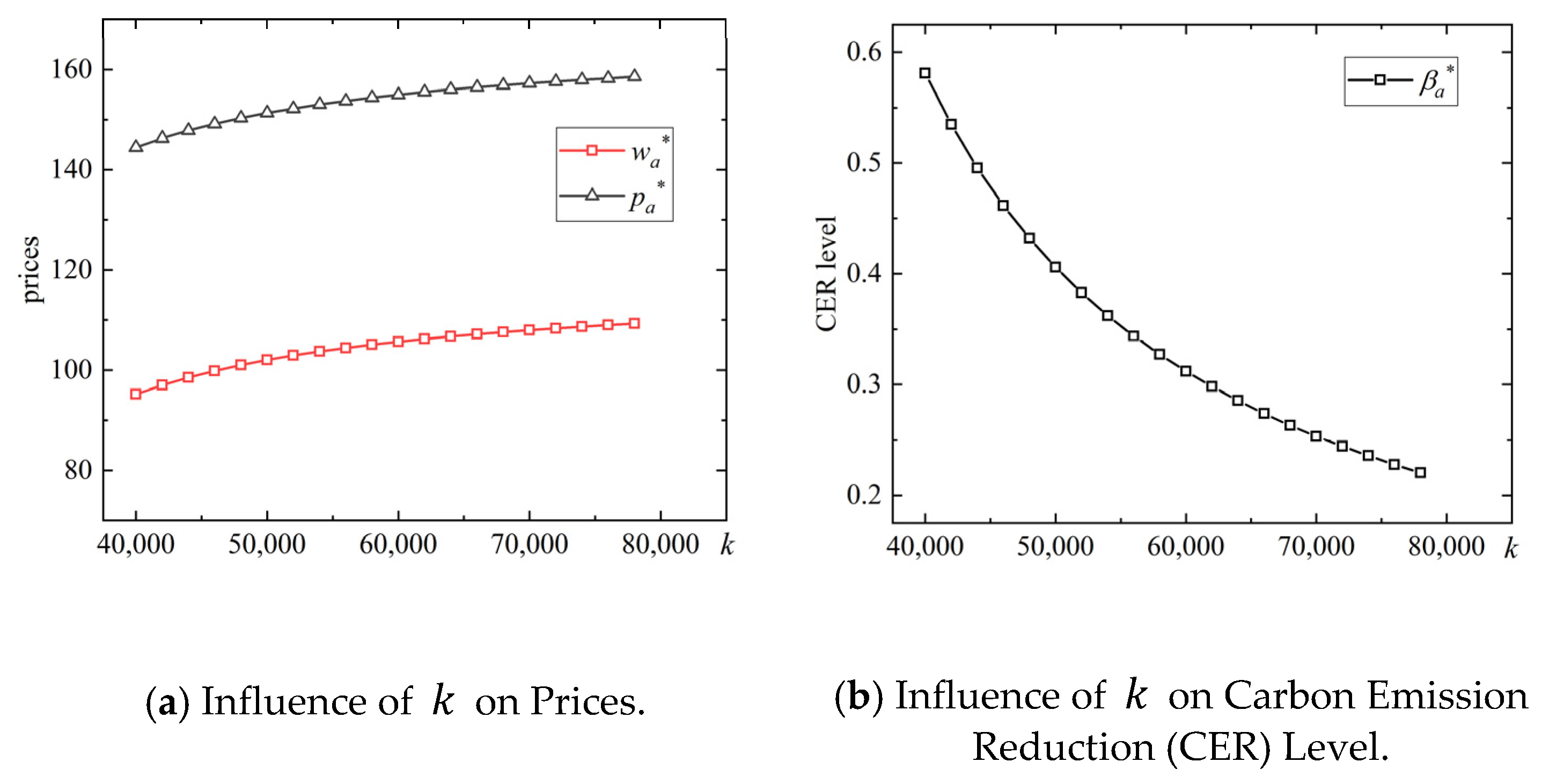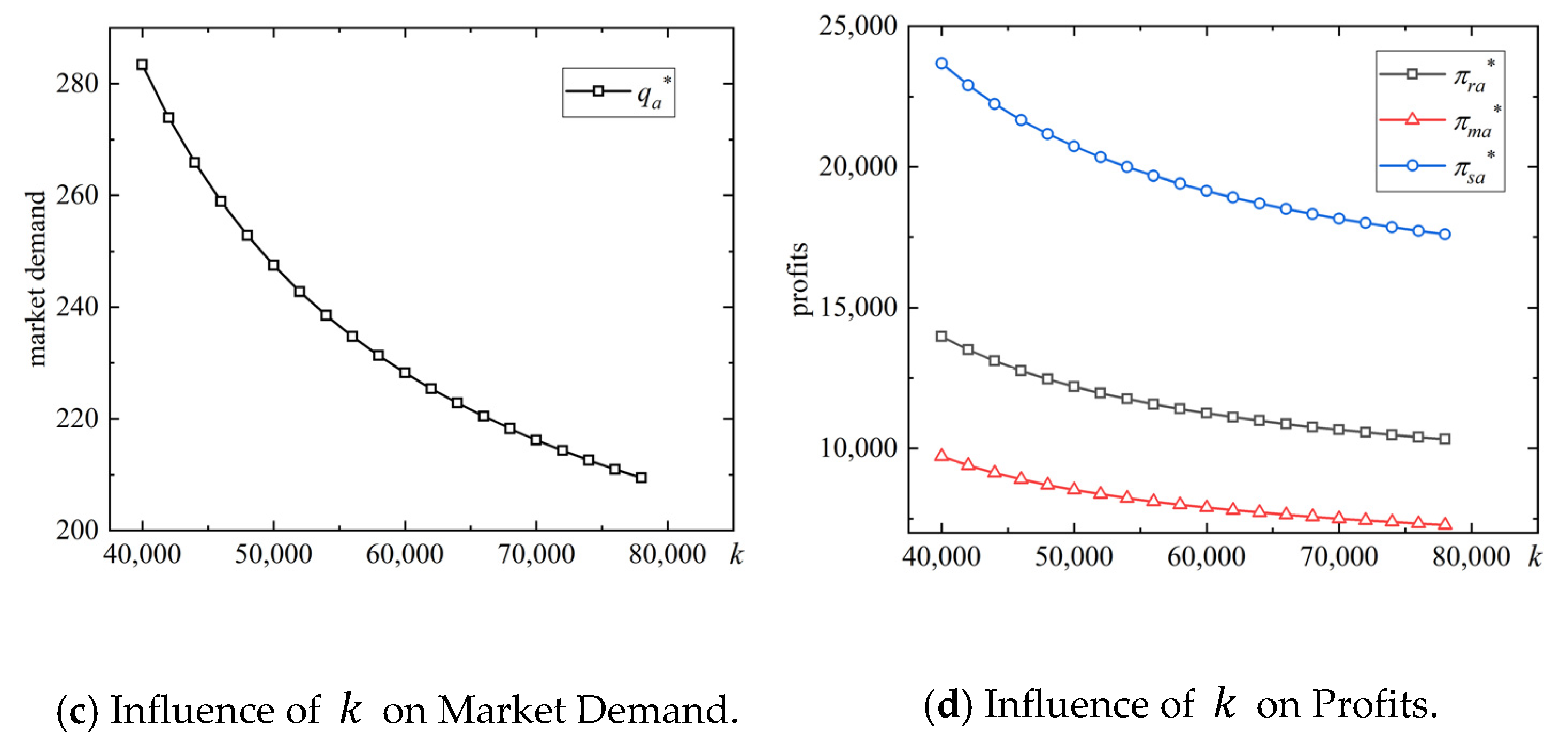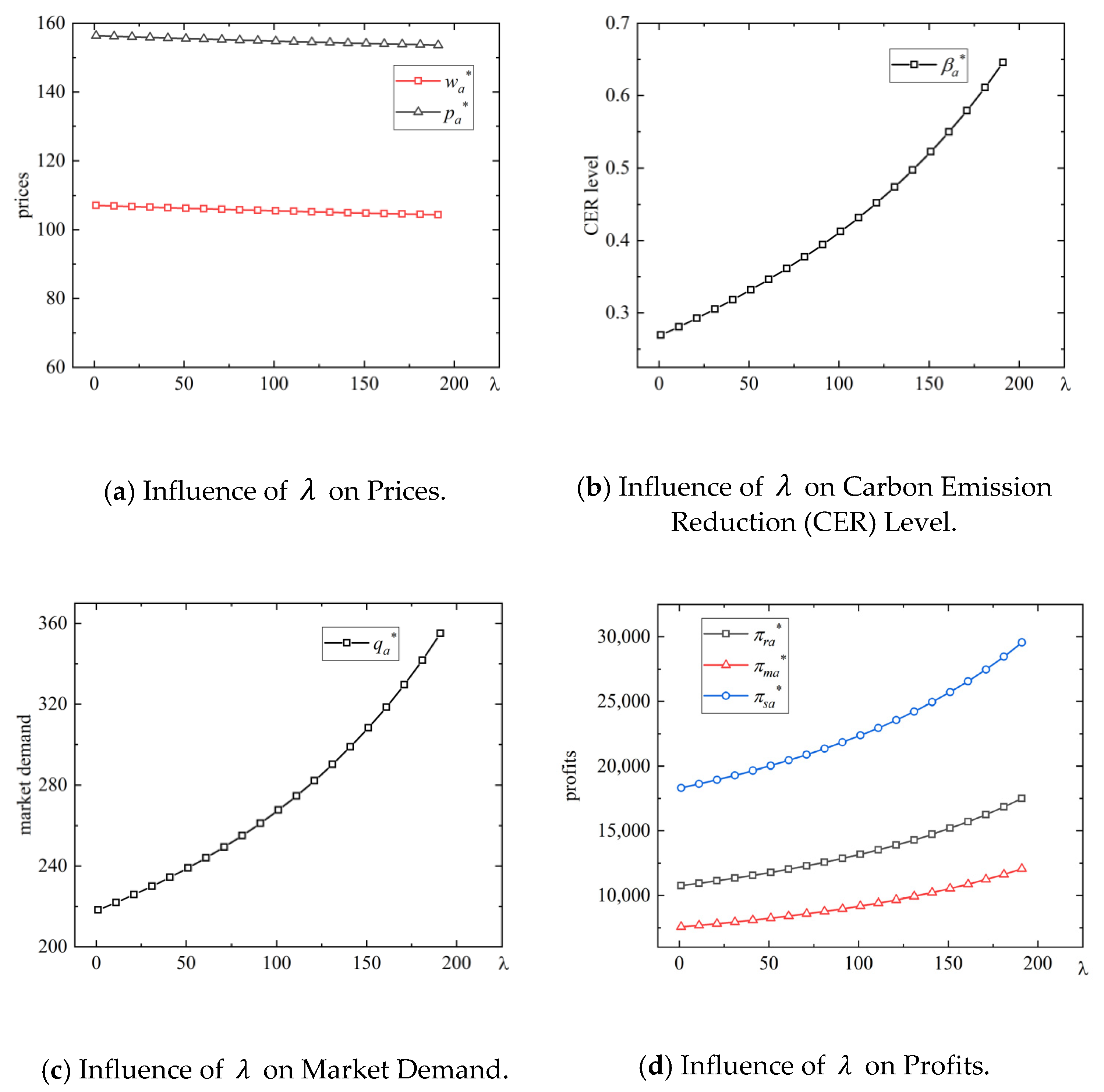Decisions for a Retailer-Led Low-Carbon Supply Chain Considering Altruistic Preference under Carbon Quota Policy
Abstract
1. Introduction
2. Literature Review
2.1. The Impact of Carbon Quota Policy on Low-Carbon Supply Chain Decision-Making
2.2. The Influence of Altruistic Preference on Low-Carbon Supply Chain Decision-Making
3. Model and Analysis
3.1. Centralized Decision-Making Model
3.2. Decentralized Model without Altruistic Preference
3.3. Decentralized Model with Altruistic Preference
4. Numerical Simulation
4.1. Effects of Main Parameters on Optimal Decisions
4.2. Comparison of The Optimal Decisions under The Three Models
5. Conclusions
5.1. Conclusions
5.2. Insights
5.3. Directions for Future Research
Author Contributions
Funding
Institutional Review Board Statement
Informed Consent Statement
Data Availability Statement
Conflicts of Interest
Appendix A
Appendix B
Appendix C
Appendix D
Appendix E
Appendix F
References
- Chan, H.S.; Li, S.J.; Zhang, F. Firm competitiveness and the European Union emissions trading scheme. Energy Policy 2013, 63, 1056–1064. [Google Scholar] [CrossRef]
- Wang, Z.; Wang, C. How carbon offsetting scheme impacts the duopoly output in production and abatement: Analysis in the context of carbon cap-and-trade. J. Clean. Prod. 2015, 103, 715–723. [Google Scholar] [CrossRef]
- Adaman, F.; Karalı, N.; Kumbaroğlu, G.; Or, I.; Özkaynak, B.; Zenginobuz, Ü. What determines urban households’ willingness to pay for CO2 emission reductions in Turkey: A contingent valuation survey. Energy Policy 2011, 39, 689–698. [Google Scholar] [CrossRef]
- Xia, L.; Liu, H.; Zhang, M.; Yuan, B.; Li, Y. Supply Chain Coordination Based on Incremental Profit-Sharing Contract of Carbon Emission Reduction under Mandatory Carbon Emissions Capacity Scheme. J. Oper. Res. Manag. Sci. 2019, 28, 92. [Google Scholar]
- Benjaafar, S.; Li, Y.Z.; Daskin, M. Carbon Footprint and the Management of Supply Chains: Insights from Simple Models. IEEE Trans. Autom. Sci. Eng. 2013, 10, 99–116. [Google Scholar] [CrossRef]
- Liu, Z.; Anderson, T.D.; Cruz, J.M. Consumer environmental awareness and competition in two-stage supply chains. Eur. J. Oper. Res. 2012, 218, 602–613. [Google Scholar] [CrossRef]
- Shuai, C.; Ding, L.; Zhang, Y.; Guo, Q.; Shuai, J. How consumers are willing to pay for low-carbon products?—Results from a carbon-labeling scenario experiment in China. J. Clean. Prod. 2014, 83, 366–373. [Google Scholar] [CrossRef]
- Wu, P.; Jin, Y.; Shi, Y.; Shyu, H. The impact of carbon emission costs on manufacturers’ production and location decision. Int. J. Prod. Econ. 2017, 193, 193–206. [Google Scholar] [CrossRef]
- Sun, Y.; Yuan, X.; Shi, K. Research on decision of supply chain of fresh agricultural product based on altruism preference. J. Syst. Eng. Theory Pract. 2017, 37, 1243–1253. [Google Scholar]
- Shen, L.; FAN, R.; Wang, Y. Pricing Service Decision and Coordination Mechanism of Low-Carbon ECSC Based on Altruistic Preference. J. Syst. Sci. Math. Sci. 2022, 42, 1788–1804. [Google Scholar]
- Fan, R.; Lin, J.; Zhu, K. Study of game models and the complex dynamics of a low-carbon supply chain with an altruistic retailer under consumers’ low-carbon preference. Phys. A Stat. Mech. Appl. 2019, 528, 121460. [Google Scholar] [CrossRef]
- Loch, C.; Wu, Y. Social preferences and supply chain performance: An experimental study. Manag. Sci. 2008, 54, 1835–1849. [Google Scholar] [CrossRef]
- Guo, W.H.; Cheng, T.C.E.; Wang, S.Y. Managing Carbon Footprints in Inventory Control. Int. J. Prod. Econ. 2011, 132, 178–185. [Google Scholar]
- Du, S.F.; Zhu, L.L.; Liang, L.; Ma, F. Emission-dependent supply chain and environment-policy-making in the ‘cap-and-trade’ system. Energy Policy 2013, 57, 61–67. [Google Scholar] [CrossRef]
- Ji, J.N.; Zhang, Z.Y.; Yang, L. Comparisons of initial carbon allowance allocation rules in an O2O retail supply chain with the cap-and-trade regulation. Int. J. Prod. Econ. 2017, 187, 68–84. [Google Scholar] [CrossRef]
- Zhang, S.; Wang, C.; Yu, C.; Ren, Y. Governmental cap regulation and manufacturer’s low carbon strategy in a supply chain with different power structures. Comput. Ind. Eng. 2019, 134, 27–36. [Google Scholar] [CrossRef]
- Mondal, C.; Giri, B.C. Analyzing a manufacturer-retailer sustainable supply chain under cap-and-trade policy and revenue sharing contract. Oper. Res. 2022, 22, 4057–4092. [Google Scholar] [CrossRef]
- Li, Z.; Pan, Y.; Yang, W.; Ma, J.; Zhou, M. Effects of government subsidies on green technology investment and green marketing coordination of supply chain under the cap-and-trade mechanism. Energy Econ. 2021, 101, 105426. [Google Scholar] [CrossRef]
- Huang, H.; Zhang, J.; Ren, X.; Zhou, X. Greenness and Pricing Decisions of Cooperative Supply Chains Considering Altruistic Preferences. Int. J. Environ. Res. Public Health 2019, 16, 51. [Google Scholar] [CrossRef]
- Wang, Y.; Yu, Z.; Jin, M.; Mao, J. Decisions and Coordination of Retailer-Led Low-Carbon Supply Chain under Altruistic Preference. Eur. J. Oper. Res. 2021, 293, 910–925. [Google Scholar] [CrossRef]
- Ma, D.; Hu, J.; Yao, F. Big data empowering low-carbon smart tourism study on low-carbon tourism O2O supply chain considering consumer behaviors and corporate altruistic preferences. Comput. Ind. Eng. 2021, 153, 107061. [Google Scholar] [CrossRef]
- Xiao, S.; Chang, X.; Chen, M. Altruistic preference and government subsidies in a manufacturing-recycling system with eco-design. J. Clean. Prod. 2022, 359, 132095. [Google Scholar] [CrossRef]
- Zhang, G.; Zhao, L.; Zhang, Q.; Zhang, Z. Effects of socially responsible behaviors in a supply chain under carbon cap-and-trade regulation. Discret. Dyn. Nat. Soc. 2021, 2021, 6218978. [Google Scholar] [CrossRef]
- Asgari, N.; Nikbakhsh, E.; Hill, A.; Farahani, R.Z. Supply chain management 1982–2015: A review. IMA J. Manag. Math. 2016, 27, 353–379. [Google Scholar] [CrossRef]
- Das, C.; Jharkharia, S. Low carbon supply chain: A state-of-the-art literature review. J. Manuf. Technol. Manag. 2018, 29, 398–428. [Google Scholar] [CrossRef]
- Barragán-Beaud, C.; Pizarro-Alonso, A.; Xylia, M.; Syri, S.; Silveira, S. Carbon tax or emissions trading? An analysis of economic and political feasibility of policy mechanisms for greenhouse gas emissions reduction in the Mexican power sector. Energy Policy 2018, 122, 287–299. [Google Scholar] [CrossRef]
- Song, J.; Leng, M. Analysis of the single-period problem under carbon emissions policies. In Handbook of Newsvendor Problems; Choi, T.-M., Ed.; Springer: New York, NY, USA, 2012; Volume 176, pp. 297–313. ISBN 9781461435990. [Google Scholar]
- He, P.; Zhang, W.; Xu, X.Y.; Bian, Y.W. Production lot-sizing and carbon emissions under cap-and-trade and carbon tax regulations. J. Clean. Prod. 2015, 103, 241–248. [Google Scholar] [CrossRef]
- Swami, S.; Shah, J. Channel coordination in green supply chain management. J. Oper. Res. Soc. 2013, 64, 336–351. [Google Scholar] [CrossRef]
- Lee, J.Y.; Choi, S. Supply chain investment and contracting for carbon emissions reduction: A social planner’s perspective. Int. J. Prod. Econ. 2021, 231, 107873. [Google Scholar] [CrossRef]
- Xu, X.; Ping, H.; Hao, X.; Zhang, Q. Supply chain coordination with green technology under cap-and-trade regulation. Int. J. Prod. Econ. 2017, 183, 433–442. [Google Scholar] [CrossRef]
- Bai, Q.G.; Xu, J.T.; Zhang, Y.Y. Emission reduction decision and coordination of a make-to-order supply chain with two products under cap-and-trade regulation. Comput. Ind. Eng. 2018, 119, 131–145. [Google Scholar]
- Li, B.; Zhu, M.; Jiang, Y.; Li, Z. Pricing policies of a competitive dual-channel green supply chain. J. Clean. Prod. 2015, 112, 2029–2042. [Google Scholar]
- Xu, L.; Wang, C.X.; Zhao, J.J. Decision and coordination in the dual-channel supply chain considering cap-and-trade regulation. J. Clean. Prod. 2018, 197, 551–561. [Google Scholar] [CrossRef]
- Jiang, W.; Liu, M.; Gan, L.; Wang, C. Optimal Pricing, Ordering, and Coordination for Prefabricated Building Supply Chain with Power Structure and Flexible Cap-and-Trade. Mathematics 2021, 9, 2426. [Google Scholar] [CrossRef]
- Gino, F.; Pisano, G. Toward a theory of behavioral operations. Manuf. Serv. Oper. Manag. 2008, 10, 676–691. [Google Scholar] [CrossRef]
- Xia, L.; Hao, W.; Qin, J.; Ji, F.; Yue, X. Carbon emission reduction and promotion policies considering social preferences and consumers’ low-carbon awareness in the cap-and-trade system. J. Clean. Prod. 2018, 195, 1105–1124. [Google Scholar] [CrossRef]
- Zou, H.; Qin, J.; Dai, B. Optimal Pricing Decisions for a Low-Carbon Supply Chain Considering Fairness Concern under Carbon Quota Policy. Int. J. Environ. Res. Public Health 2021, 18, 556. [Google Scholar] [CrossRef]
- Fehr, E.; Schmidt, K.M. A theory of fairness, competition, and cooperation. Q. J. Econ. 1999, 114, 817–868. [Google Scholar] [CrossRef]
- Charness, G.; Rabin, M. Understanding Social Preferences with Simple Tests. Q. J. Econ. 2002, 117, 817–869. [Google Scholar] [CrossRef]
- Nie, D.; Li, H.; Qu, T.; Liu, Y.; Li, C. Optimizing supply chain configuration with low carbon emission. J. Clean. Prod. 2020, 271, 122539. [Google Scholar] [CrossRef]
- Fehr, E.; Schmidt, K.M. The economics of fairness, reciprocity and altruism—Experimental evidence and new theories. In Handbook of the Economics of Giving, Altruism and Reciprocity; Elsevier Science: New York, NY, USA, 2006; Volume 1, pp. 615–691. [Google Scholar]
- Wan, X.; Jiang, B.; Qin, M.; Du, Y. Pricing decision and coordination contract in low-carbon tourism supply chains based on altruism preference. Environ. Eng. Manag. J. 2019, 18, 2501–2518. [Google Scholar]
- Wang, Y.; Yu, Z.; Shen, L.; Dong, W. E-Commerce Supply Chain Models under Altruistic Preference. Mathematics 2021, 9, 632. [Google Scholar] [CrossRef]
- Liu, J.; Zhou, L.; Wang, Y. Altruistic Preference Models of Low-Carbon E-Commerce Supply Chain. Mathematics 2021, 9, 1682. [Google Scholar] [CrossRef]
- Wang, M.Y.; Li, Y.M.; Li, M.M.; Shi, W.Q.; Quan, S.P. Will carbon tax affect the strategy and performance of low-carbon technology sharing between enterprises? J. Clean. Prod. 2019, 210, 724–737. [Google Scholar] [CrossRef]
- Liu, G.D.; Chen, J.G.; Li, Z.Y.; Zhu, H.G. Green supply chain innovation strategies considering government subsidy and altruistic preference. Math. Probl. Eng. 2022, 2022, 5495374. [Google Scholar] [CrossRef]
- Bakal, I.S.; Akcali, E. Effects of random yield in remanufacturing with price-sensitive supply and demand. Prod. Oper. Manag. 2006, 15, 407–420. [Google Scholar] [CrossRef]
- Nair, A.; Narasimhan, R. Dynamics of competing with quality-and advertising-based goodwill. Eur. J. Oper. Res. 2006, 175, 462–474. [Google Scholar] [CrossRef]
- Nie, T.; Du, S. Dual-fairness supply chain with quantity discount contracts. Eur. J. Oper. Res. 2016, 258, 491–500. [Google Scholar] [CrossRef]







| References | Cap-and-Trade | Retailer-Led | Low-Carbon Supply Chain | Altruistic Preference |
|---|---|---|---|---|
| [11] | ✓ | ✓ | ||
| [16] | ✓ | ✓ | ✓ | |
| [20] | ✓ | ✓ | ✓ | |
| [23] | ✓ | ✓ | ✓ | |
| This paper | ✓ | ✓ | ✓ | ✓ |
| Parameters | |
| manufacturer’s unit production cost | |
| cost coefficient of carbon reduction investment | |
| free carbon quotas provided by the government | |
| unit initial carbon emissions of product | |
| unit carbon trading price | |
| initial market demand for product | |
| price sensitivity coefficient of consumer | |
| low-carbon preference coefficient of consumer | |
| altruistic preference coefficient of retailer | |
| centralized decision | |
| decentralized without altruistic preference decision | |
| decentralized with altruistic preference strategy | |
| Decision Variables | |
| wholesale price of per unit product | |
| sales price of per unit product | |
| per unit product profit of the retailer | |
| carbon emission reduction rate per unit product | |
| Functions | |
| market demand function of low-carbon product | |
| the retailer’s profit function | |
| the manufacturer’s profit function | |
| profit function of the supply chain | |
| the retailer’s utility function | |
Disclaimer/Publisher’s Note: The statements, opinions and data contained in all publications are solely those of the individual author(s) and contributor(s) and not of MDPI and/or the editor(s). MDPI and/or the editor(s) disclaim responsibility for any injury to people or property resulting from any ideas, methods, instructions or products referred to in the content. |
© 2023 by the authors. Licensee MDPI, Basel, Switzerland. This article is an open access article distributed under the terms and conditions of the Creative Commons Attribution (CC BY) license (https://creativecommons.org/licenses/by/4.0/).
Share and Cite
Zhou, X.; Wu, X. Decisions for a Retailer-Led Low-Carbon Supply Chain Considering Altruistic Preference under Carbon Quota Policy. Mathematics 2023, 11, 911. https://doi.org/10.3390/math11040911
Zhou X, Wu X. Decisions for a Retailer-Led Low-Carbon Supply Chain Considering Altruistic Preference under Carbon Quota Policy. Mathematics. 2023; 11(4):911. https://doi.org/10.3390/math11040911
Chicago/Turabian StyleZhou, Xiao, and Xiancong Wu. 2023. "Decisions for a Retailer-Led Low-Carbon Supply Chain Considering Altruistic Preference under Carbon Quota Policy" Mathematics 11, no. 4: 911. https://doi.org/10.3390/math11040911
APA StyleZhou, X., & Wu, X. (2023). Decisions for a Retailer-Led Low-Carbon Supply Chain Considering Altruistic Preference under Carbon Quota Policy. Mathematics, 11(4), 911. https://doi.org/10.3390/math11040911





